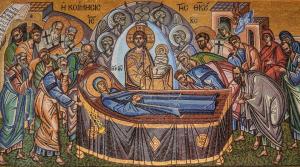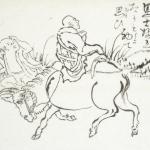
Mary died. Mary, the Mother of God, died. She was human like the rest of us. Indeed, because she was sinless, she, more than the rest of us, lived a proper and fully human life. She didn’t have any sin which could have got in the way of her living out her perfectly good human nature. Sin corrupts people and turns them against their nature, which is why the more someone sins, the more unnatural they become. Mary was not touched by any sin, so her humanity was perfect. She embraced it. She fulfilled it. As she was perfectly human, free from any unnatural corruption from sin, she was able to represent humanity to God. This is what she did when she, being asked if she were willing to become the mother of the incarnate God-man, Jesus, answered yes.
To truly be our representative, to truly show God all that humanity was in and of itself when it is free from all unnatural corruption, she had to take on everything found within the human condition including death. She died, but her death was not the death of a sinner. Her humanity was incorrupt, and so in her death, she would know no corruption or decay as Jesus, her son, took her unto himself and gave to her participation in the resurrection with all its glory: this is what it means when we say she was assumed into heaven. In and through her, all humanity is likewise able to be assumed into heaven. Her assumption demonstrates the fulfillment of the work of the incarnation, that is, the assumption of humanity (and the rest of creation) into the divine life. Mary lived a perfectly human life; this is why she was able to have the death of a perfect human, and in that death, she is able to show us God’s intention for all humanity. She represented humanity to God even as she represented humanity to the rest of us – we see in and through her the destiny of humanity, of what is to happen to all who cooperate with grace.
Some people do not want to believe Mary died. They think she was taken into heaven without experiencing death; this, they say, is because she knew no sin and so she could not know death. If this were the case, then Jesus would not have been able to die, for he also knew no sin. Death without sin is not a spiritual death, but it is still death. Mary died, and whether or not it is was always the case that all who lived in the world would one day die (with or without sin), or because she willingly chose to die so as not to be seen as greater than her son (as some spiritual writers suggest), what is important is that we realize she died. This is the normative teaching of tradition. In doing so, we know she really was one of us. We must not let piety become so excessive and obsessive that it leads to superstitious attitudes; we most always remember Mary is indeed holy and blessed but she is holy and blessed as one of us. If we try to cut her off from the rest of humanity, we lose sight of her role in history, of why she was great – her greatness was found in the way she was so perfectly human and not because she was something other than human. Jesus reminded us of this when he spoke and acted against those who would praise Mary for all the wrong reasons:
As he said this, a woman in the crowd raised her voice and said to him, “Blessed is the womb that bore you, and the breasts that you sucked!” But he said, “Blessed rather are those who hear the word of God and keep it!” (Lk. 11:27-28 RSV).
We must be careful when we interpret Jesus’ reply. He was not denying Mary’s blessedness, but rather he was pointing out how that holiness can be and is shared by all who hear the word of God and keep it. Mary is blessed because she indeed heard the word – and affirmed it when she gave her yes to God’s plan for her at the annunciation. Her affirmation did not stop with the annunciation; her whole life was a living affirmation of the incarnation and so she is blessed because she truly fulfilled the word of God in her life. She affirmed the incarnation especially in and through her perfect humanity, rendering to the world and to God that perfect humanity. To us, she teaches us what it means to be perfectly human so we can follow her example and be blessed. To God, she is the one who, in her perfect humanity, gave all that humanity had to offer to God so that God could assume human nature and become one of us, living out that humanity, showing that our humanity has many possible ways which it can be lived and still be perfectly human. Mary’s way is that of perfect humanity but so is Jesus’ way, showing us that, through grace, there are many ways that our humanity can be lived out. This is why her death is important: through it we learn that if we live out our humanity and let it thrive, we too can follow after her and find our humanity is assumed into heaven and raised into glory. That is, the death and resurrection of Jesus was not his alone, but something shared with and able to be experienced by us all. If we have not attained the perfection of our humanity, however, we will have to experience a transformation in and through our death so that then we can become perfectly human, without sin, without corruption and then taken up and received into glory. This would be impossible for us if we had to do so all by ourselves, but with the help of the grace of God, this is possible for one and for all, so that humanity as a whole, indeed, all creation as a whole, is called to follow Mary and be assumed into glory.
Mary, like her son, did not look to glorify herself. She did not look for people to come to her like the woman did, to speak such blessings to her in a way to undermine her own humanity. Rather, Mary, like Jesus, was proven great because she was beyond all that and so lived her life as a loving servant of God. She lived as Paul told us to live, following the example of her son, living a humble life without need for temporal glory:
Have this mind among yourselves, which was in Christ Jesus, who, though he was in the form of God, did not count equality with God a thing to be grasped, but emptied himself, taking the form of a servant, being born in the likeness of men. And being found in human form he humbled himself and became obedient unto death, even death on a cross (Philip. 2:5-8 RSV).
As Jesus had no problem humbling himself all the way to death, Mary, who lived the perfect human life also had no problem humbling herself all the way to death. Their deaths differed, to be sure, as Jesus died as the God-man, so as to face all the corruption sin brought to death and overcame it from within, while Mary died as the perfect loving follower of the Son who found the love of the Son surrounded her and rendered unto her the glory which was his to give and hers to receive. We can and should honor her, we can call her blessed, we can call upon her – but we must do so, not in a way which separates her from the rest of us, but in the way which recognizes our common humanity and so our unity with her. Her assumption is the assumption of humanity, and therefore, another indication of what the incarnation was about, that is, the assumption of a created human nature so as to render it (and all created natures) the divine glory.
Stay in touch! Like A Little Bit of Nothing on Facebook.
If you liked what you read, please consider sharing it with your friends and family!













